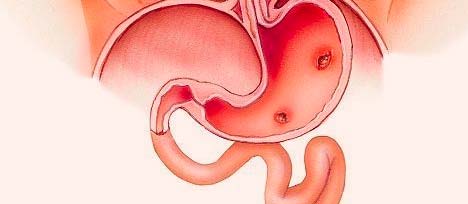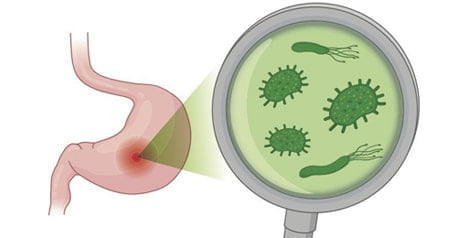Approximately 40% of Americans have Helicobacter pylori (H. pylori) infection. Though the infection is usually asymptomatic, it can affect the lining of your stomach and cause peptic ulcers or gastritis. Manhattan Gastroenterology, which has three locations in New York City, is staffed with highly qualified doctors to diagnose and treat H. pylori infections in order to resolve gastrointestinal problems and improve your quality of life.
What is H. Pylori?
H. pylori or Helicobacter Pylori (most commonly referred to as “H. pylori”) is a medical condition isolated to the upper gastrointestinal tract and diagnosed by our gastroenterologists. It is the most common chronic stomach bacteria infection in humans. By some estimates, it may be present in up to one-half of the world’s population. The estimated prevalence is up to 70% in developing countries and 30 – 40% in the United States and other developed countries.
Who Is at Risk for H. Pylori Infection?
H. pylori infection is most commonly acquired in childhood, but it can occur in adults as well. The bacteria is present in more than half of the American population over the age of 50 and in over half of all African Americans. The following are some of the most common H. pylori risk factors:
- Smoking
- Consumption of nonfiltered water
- Family history of gastric cancer
- Lower socioeconomic status
- Consumption of restaurant food and meat
- Crowded living conditions
- Soil-related occupations
- Living with someone who has an H. pylori infection
What Are Symptoms Of H. Pylori Infection?

In most people, the bacteria will cause no symptoms and will have no long-term health effects. The bacteria is found in the stomach and can cause upper abdominal pain, bloating, and nausea in some patients. H.Pylori can lead to the formation of ulcers in the stomach or the duodenum (the first part of the small intestine) or even to stomach cancer in certain individuals. Although stomach cancer is uncommon as a result of H.pylori infection, it is a concern given how many individuals are infected with it worldwide. Experts don’t know why some individuals have no symptoms while others can have many problems because of this chronic infection.
”
★ ★ ★ ★ ★The entire staff was welcoming and made the visit quick and seamless. The office is clean, and the staff even make a point in offering coffee or water while you wait. The doctor was very friendly and to the point. Highly recommend choosing this office.
How Is H. Pylori Spread?
H. Pylori typically spreads through the consumption of food or water contaminated with fecal matter. The higher prevalence of this infection in developing countries may be due to contaminated water supplies. After exposure, H. Pylori can then infect the stomach lining and release enzymes and toxins that can inflame and injure the cells lining the stomach or duodenum. In the US, infection is uncommon during childhood and becomes more common as adults, whereas most children in developing countries are affected at a young age.
What Tests Are Available For Diagnosis?

A trained doctor should manage the diagnosis and disease treatment. In general, individuals should be tested for h.pylori if they have or have had stomach or duodenal ulcers. H. Pylori symptoms can include ulcer disease, upper abdominal pain, bloating, and nausea. However, there are numerous other causes of ulcers, particularly in patients taking nonsteroidal anti-inflammatory drugs. Furthermore, patients with these symptoms may require further testing in addition to h. pylori evaluation. Patients with a family history of stomach cancer may also be tested for H. pylori.
There are many tests to diagnose h. pylori.
Noninvasive testing includes:
- blood tests
- breath tests
- stool samples
Invasive testing, such as upper endoscopy may be needed. We can also take biopsies to determine the presence of H. pylori. Please see your gastroenterologist for an evaluation of your symptoms and the development of an effective treatment plan.
What Is The Treatment For H. Pylori?
We usually prescribe antibiotic regimens after one is diagnosed with h.pylori. Several different regimens are approved and effective. Patients must complete the entire treatment. If we find bacteria, we should treat it because that will help ulcers heal, decrease recurrence rates, and decrease more rare long-term consequences of h.pylori. In addition, you should undergo a breath test or stool test to document the cure after treatment.
How Does One Know The Bacteria Is Killed?
To ensure that the bacteria were killed, eradication testing, such as the urea breath test, biopsy-based test, and stool antigen test, should be performed. For better diagnostic accuracy, we recommend that you get tested 30 days after finishing your therapy. Because H. pylori clearance or suppression may occur during treatment, failing to identify H. pylori on tests done within four weeks after finishing your antibiotic regimen may be a false-negative result. This is because clearance or suppression is usually followed by a recurrence of the original infection.
What Can Be Done If The Bacteria Does Not Get Killed?
The treatment for H. Pylori gastritis is generally effective, but it may fail in 20% of cases. These patients can take different antibiotic regimens as prescribed by their doctor. In this case, an effective treatment plan should include two therapies that, when used together, achieve a nearly 100% cure rate. Because retreatment with the same regimen is not recommended, second-line treatment is determined by the treatment method used initially.
Can You Prevent H. Pylori Infection?
You can take certain self-care preventative measures to reduce your risk of contracting H. pylori infection, such as:
- Practice proper hand hygiene, especially before preparing, cooking, or eating food
- Prevent iron deficiency anemia by getting the right balance of nutrients
- Make sure the water you drink and use during food preparation is clean
- Increase your intake of cruciferous vegetables (ie. kale, cabbage, cauliflower, and brussels sprouts)
Unfortunately, there are no advanced vaccine candidates at this time, with only one in the early stages of clinical trials. However, this trial has already shown that the vaccine greatly reduced the likelihood of H. pylori infection in children for up to three years.
What Are the Complications of H. Pylori Infection?
H. pylori infection is asymptomatic in most cases, but there is a risk for some patients to develop serious complications, including:
- Stomach ulcers
- Inflammation of the stomach lining
- Gastric and esophageal cancer
H. pylori is also associated with the incidence of idiopathic thrombocytopenic purpura, a disorder characterized by the low amount of blood platelets that stop or prevent bleeding.
Doctor’s Note: The only intent of this information is to provide general information about H. pylori, not definitive medical advice. Please consult our doctors about your specific condition for a conclusive diagnosis. Only trained, experienced H. pylori specialists like ours can determine an accurate H. pylori diagnosis and proper treatment.
As the best H. Pylori doctors in the Upper East Side, our specialists provide highly personalized and comprehensive care. For more information about H. pylori or to schedule a consultation, please contact our NYC gastroenterology offices.

